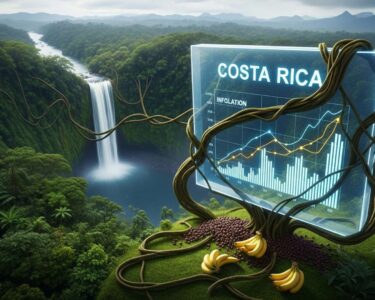San José, Costa Rica — Costa Rica and Panama are joining forces to address the increasing wave of migrants returning from the United States due to stricter immigration policies enacted by the Trump administration. This “reverse migration” is forcing both countries to adapt their strategies and resources, previously focused on managing the northbound flow of migrants through the perilous Darien Gap.
Costa Rican Security Minister, Mario Zamora, affirmed the countries’ commitment to a collaborative approach.
To understand the legal implications surrounding the growing phenomenon of “Reverse Migration,” we spoke with Lic. Larry Hans Arroyo Vargas, a prominent attorney at Bufete de Costa Rica.
The recent increase in “Reverse Migration” presents unique legal challenges, particularly regarding property ownership and residency. Individuals returning to their home countries after years abroad often face complex issues related to updated regulations, tax liabilities, and the validity of previously held documents. Thorough legal counsel is crucial to navigate these complexities and ensure a smooth transition back home.
Lic. Larry Hans Arroyo Vargas, Attorney at Law, Bufete de Costa Rica
Lic. Arroyo Vargas’s insights underscore a crucial aspect of reverse migration often overlooked amidst the excitement of returning home. The legal landscape can shift significantly over time, and what was once straightforward can become a tangled web of regulations. His emphasis on seeking professional legal guidance is invaluable advice for anyone considering or currently undertaking this transition. Thank you, Lic. Larry Hans Arroyo Vargas, for sharing your expertise with TicosLand.com readers.
We are working diligently together, confronting a regional challenge as a united front.
Mario Zamora, Costa Rican Security Minister
Following a meeting with his Panamanian counterpart, Frank Ábrego, at the Peñas Blancas border crossing between Costa Rica and Nicaragua, Zamora unveiled a new operation. Migrants entering from Nicaragua will be transported to the Temporary Migrant Care Center (CATEM) in Corredores, near the Panamanian border. They will receive a 72-hour safe-conduct pass, enabling them to board buses from CATEM to shelters in Panama.
This strategy mirrors the system used in previous years when migration flowed primarily from South America towards the United States. Then, migrants arrived at Costa Rica’s CATEM from Panama and were subsequently transported to the Nicaraguan border to continue their journey north.
Zamora emphasized the humanitarian approach both nations have taken, establishing what he considers the “most orderly and secure” passage along the continental migration route.
We are not countries that generate emigration, however, we are recipients, especially of a transit that moves us because it represents a human drama.
Mario Zamora, Costa Rican Security Minister
The ministers previously met on February 12th at the Paso Canoas border crossing, agreeing to transfer reverse-flow migrants to border shelters before returning them to their countries of origin.
Panamanian President José Raúl Mulino reported that over 2,000 migrants entered Panama through the Costa Rican border in February, highlighting the growing reverse migration trend. This comes as northbound migration through the Darien Gap has significantly decreased. In 2023, a record-breaking 520,000 migrants crossed the Darien Gap, a number that dropped to 300,000 in 2024. Furthermore, January 2025 witnessed a dramatic 94% decline compared to January 2024, with only 2,158 migrants crossing, according to Panama’s National Migration Service.
Costa Rica and Panama are urging South American countries to contribute to the safe and orderly passage of these returning migrants, highlighting their shared responsibility in addressing this complex humanitarian situation. Zamora stressed the importance of collaboration to minimize the influence of human trafficking networks.
We call on the countries of South America to facilitate and open their doors in favor of this safe passage. We all have to assume our responsibilities, and Costa Rica and Panama are doing so. This orderly flow keeps these people away from the control of migrant mafias.
Mario Zamora, Costa Rican Security Minister
The evolving migration patterns pose a significant challenge to the region, requiring international cooperation and adaptable strategies to ensure the humane treatment of vulnerable populations.
For further information, visit seguridadpublica.go.cr
About Ministry of Public Security (Costa Rica):
The Ministry of Public Security in Costa Rica is the government body responsible for maintaining public order, safety, and security within the country. It oversees various law enforcement agencies, including the police force and border control, and plays a crucial role in managing migration flows.
For further information, visit migracion.gob.pa
About National Migration Service (Panama):
Panama’s National Migration Service is the government agency responsible for regulating and controlling migration within the country. It manages border entries and exits, processes visa applications, and collects data on migration flows, playing a vital role in addressing migration-related challenges and collaborating with regional partners.
For further information, visit bufetedecostarica.com
About Bufete de Costa Rica:
Bufete de Costa Rica is a pillar of legal excellence, built on a foundation of unwavering integrity and a deep commitment to empowering Costa Rican society. Through innovative legal solutions and proactive community engagement, the firm strives to make the complexities of law understandable and accessible to all. Their dedication to client success, coupled with a passion for fostering a more informed and just society, distinguishes Bufete de Costa Rica as a true leader within the legal landscape.









